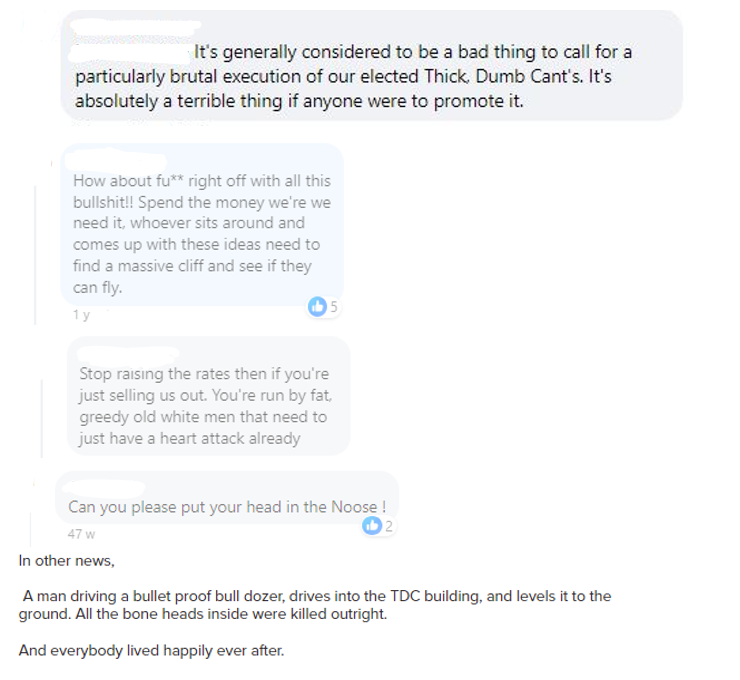
Mayors and councillors are claiming an “increasing level of intimidation and abuse” with more than half saying it was worse than a year ago.
The recent poll data from Local Government New Zealand (LGNZ) can be reflected in Nelson Tasman, where former Nelson Mayor Rachel Reese arrived home to find an “enraged stranger” in her house.
Open Justice reported over the Matariki weekend about how the man brought a nail gun to Reese’s property on 27 February and appeared to be speaking the anti-Government “agenda” of Sovereign Citizens.
LGNZ chief executive Susan Freeman-Greene described the event as “horrific”.
“Sadly, it won’t come as a huge surprise to those in local government,” she said.
53 percent of polled elected members said the level of abuse they were facing was greater than a year ago.
In addition, 65 percent of elected members said they had faced abuse online, 39 percent had faced it at community events, and 33 percent faced it doing everyday activities, like shopping or collecting children from school.
“This is a rising trend that affects everyone elected in our democracy.”

Nelson City Council has seen a “noticeable increase” in upset or angry customers across all areas of the council over the last 18 months.
In the past year, the council has reported 87 incidents have been to the police. Since 2020, there have 179 reported incidents.
“These figures include death threats, aggressive behaviour, threats, vandalism, and theft,” said Jane McLeod, the council’s acting group manager corporate services.
“Council’s customer service centre staff and transfer station staff are particularly affected…
“While serious incidents are infrequent, continued exposure to upset, angry or aggressive customers can have a significant impact on individual wellbeing.”
Customer aggression has been identified by the council as one of four key health and safety risks to staff.
In the past year, council has increased staff training on how to stay safe when dealing with aggressive customers, and a new and improved training programme is under development which includes de-escalation techniques and determining when to refuse service.
“The people who behave in aggressive and threatening ways make up only a small percentage of council’s customers,” McLeod added.

“I am used to getting a bit of abuse in public, but people’s homes must be a no-go area. What Rachel experienced was even worse in that the abuser broke into her home.”
He also said the “vast bulk” of Nelsonians are friendly and respectful, including those who have strong concerns and problems with the council.
When confronted with abuse or threatening behaviour from “fewer than 1 percent of people”, Smith said he tries to exit the area “as quickly as possible”.
“You cannot let this small minority get in the way of being open and available to the public.”
He added that he feels “much safer” as mayor than when he was a Government minister, to which he credits the city’s “respectful culture”.
“But this is being tested by global influences that are driving greater polarisation and extremism.”
Smith also said people should be “mindful of the dangers of social media”, particularly the belief that a large collection of likes reflects a majority opinion.
In April, the council turned off the comments on its information-only social media posts to remove a platform for users to “wholesale” post misinformation and abusive commentary.

“I am leading an amazing group of people, and they’re not muppets. They make difficult decisions with competing priorities,” he said.
“I am fed-up with those few people, and it’s only a few people, those keyboard warriors that can get on and make just outrageous statements which are not appropriate, so stop it please.”
The problem is also present in neighbouring Tasman where the district council’s staff have in the past received death threats and letters sent to their former houses.
Tasman District Council has noticed an increase in unacceptable behaviour towards both elected members and staff since 2020.
“The number continue to grow, not quite as fast as last year but still climbing,” a council spokesperson said.
Based on reports, there appear to be incidents every week and can occur over phone calls and social media, in letters and emails, or in person.
The spokesperson said the council has provided training aimed at de-escalating situations, managing stress, and introducing several processes to ensure staff feel secure but added that kind of behaviour was not acceptable.
“We understand people face any number of pressures, but it is neither constructive or appropriate to take out those pressures on someone who has no influence in their cause or solution.”
Currently, there are only a relatively small number of people who “continue to cross the line into unacceptable behaviour”, however new individuals do sometimes target staff, potentially “emboldened” by others, the spokesperson said.
The police are informed where staff are perceived to be at risk.
Tasman Mayor Tim King has recently raised safety concerns for elected members and council staff at an LGNZ forum.
He said there was a rise in behaviour from people labelled as Sovereign Citizens which used to be annoying and time-consuming but now raised increasing concerns about safety.
‘Sovereign Citizen’ is a broad term that refer to several different movements that believe that one can opt out of New Zealand’s laws.
A health and safety report for the council’s 2022-23 financial year considered the potential for Sovereign Citizens to threaten or harm staff and elected members a “high priority”.
- Local Democracy Reporting is local body journalism co-funded by RNZ and NZ On Air












